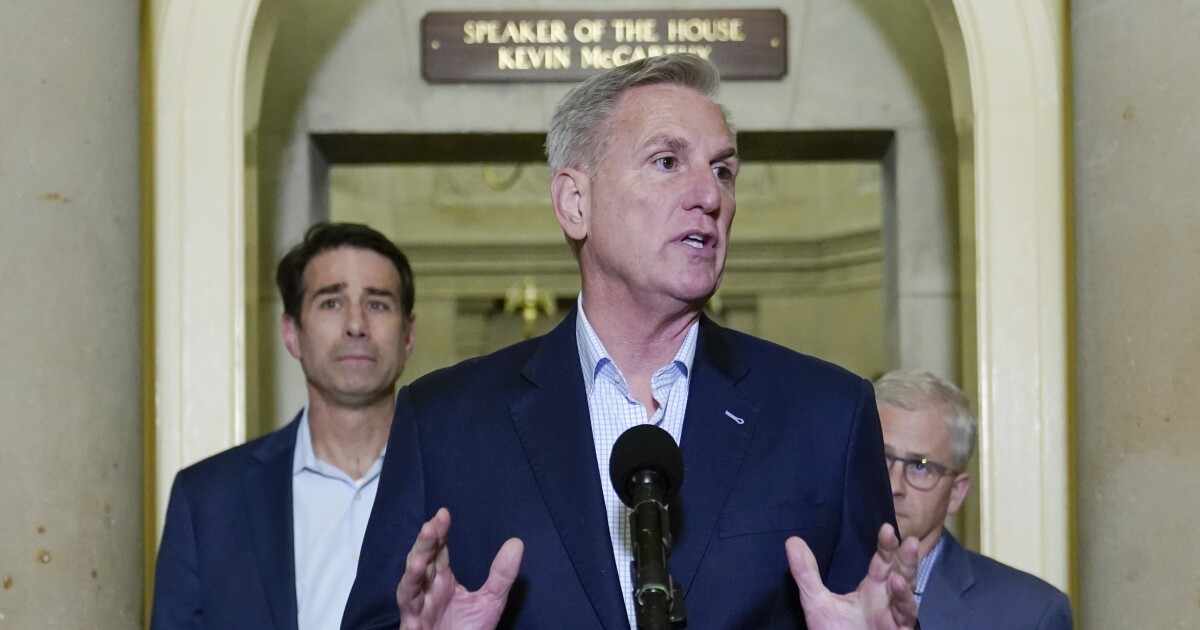

The House Rules Committee narrowly voted to advance the bipartisan Fiscal Responsibility Act, overcoming growing opposition within the Republican Party and taking the first step toward raising the debt ceiling just six days before the country is set to default on its loans.
The 13-member panel voted 7-6 to advance the bill, with only Reps. Chip Roy (R-TX) and Ralph Norman (R-NC) joining all Democrats to vote against the measure. The committee is controlled by nine Republicans. The legislation now heads to the floor for a vote on Wednesday, which is scheduled to take place at 8:30 p.m.
DEBT LIMIT DEAL: WHERE IT STANDS AND WHAT IS STILL TO COME
“In a true negotiation, you always get less than you want and give up more than you’d like,” committee Chairman Tom Cole (R-OK) said on Tuesday. “But with the passage of the Fiscal Responsibility Act, it will responsibly lift the debt ceiling and avoid default that would devastate the American economy, and we will achieve real reductions in spending. … This is the most consequential spending reduction bill in more than a decade.”
The committee vote marked the first test for the debt ceiling deal that was brokered between House Speaker Kevin McCarthy (R-CA) and President Joe Biden over the weekend, which has already received staunch opposition from members of both parties who say the deal does not adequately meet their demands.
Some key members of the Rules Committee vowed to vote against advancing the bill to the floor altogether, threatening to kill the agreement before it could even reach the floor for a full vote. Roy and Norman were quick to come out against the deal shortly after it was announced on Saturday, raising questions about whether the bill would survive a committee vote.
As a result, all eyes turned to Rep. Thomas Massie (R-KY), who expressed opposition to the bill but stopped short of saying whether he’d block it from getting to the floor. Massie ultimately voted to advance the bill, securing the majority vote needed.
“It’s not our job to imprint an ideology,” Massie said. “When people want to express their ideology, the floor of the House on the actual final passage of the bill is the place to do that. [We] owe them an honest shake and a playing field that doesn’t change.”
However, the vote didn’t come without opposition from some of the committee’s Republicans who have called on McCarthy to kill it, with others questioning whether it is enough to reconsider his speakership. At least one Republican, Rep. Dan Bishop (R-NC), has publicly threatened to file a motion to vacate McCarthy’s speakership.
More Republicans could join Bishop’s calls, especially after the bill advanced through the committee through a closed-rules process and without unanimous Republican support — two key concessions McCarthy made when elected as speaker.
As a result, Roy has hinted he may also be open to a motion to vacate after posting to Twitter on Monday that a concession was made during speakership elections in January that nothing could pass the Rules Committee unless all seven Republicans were on board, a deal that had not been made public before this week.
“We will see,” Roy said when asked if he would consider a motion to vacate. “I’m not going to go down that road right now other than just to point out that a general part of the agreement … was that we would have unanimous support when we come out of the Rules Committee.”
It’s unclear whether such a deal had been made between McCarthy and other Republicans, as the rule is not codified in the House rules, and there is no written record of the agreement, according to Cole.
“That’s not what the rules say. So if [Roy] has an agreement with the speaker or something, I’m not aware of it, and that’s up to them,” Cole told the Washington Examiner. “But, you know, we have to have seven votes to get it out of committee or majority of those actually voting. There’s multiple paths that we could get there. But, you know, my job is simply to get the bill out of here on the floor.”
CLICK HERE TO READ MORE FROM THE WASHINGTON EXAMINER
Once the debt ceiling deal is passed through the House, the legislation will head to the Senate, where it could take a few days before it is passed. After that, it will be sent to President Joe Biden’s desk for his signature.
The clock is ticking for Congress to advance the legislation before the so-called X-date on June 5, the day the country is expected to no longer be able to pay off its debts. Treasury Secretary Janet Yellen updated the deadline from her initial projection of June 1, buying lawmakers four extra days to finalize an agreement and get a bill passed before a possible default.





